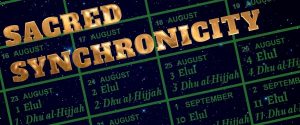
Director’s Desk: Sacred Synchronicity
This past Wednesday marked the beginning of Dhu al-Hijjah, the twelfth and final month of the Islamic calendar. The first ten days of Dhu al-Hijjah are a time imbued with great holiness. The rituals of the hajj are performed during the eighth, ninth, and tenth day of the month, culminating in Eid al-Adha, the “Festival of the Sacrifice,” which begins on the tenth day.







